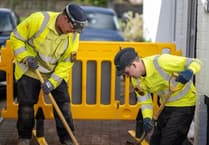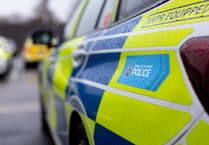Women across Cornwall are encouraged to complete an online survey that will feed into a national initiative to end violence against women and girls.
Walk My Walk is hosted by The Women’s Centre Cornwall and Safer Cornwall, and will inform the Home Office about the reality of women’s experiences on our streets, in particular in terms of harassment and abuse.
Having initially being based on Truro, it has been extended to whole of Cornwall and remains open throughout September 2023. More responses are needed, from a variety of age groups.
“The more voices are heard, the better,” says communications and training coordinator Beth Williams. “We can do things with this information: take it to Devon and Cornwall Police, for example. The more shared experiences we have, the better they can inform strategy.”
It’s been a busy year for the service, which is based in Bodmin but helps women throughout the Duchy.
In July, Queen Camilla visited the centre to learn more about its work from staff and users. Abuse survivors talked to Her Majesty about getting involved in activities like boxing and cycling, while the Young Empowered Women shared poetry and artwork. The Queen also planted an apple tree in the centre’s new rewilded garden.
In mid-August, the associated Safer Streets programme enlisted New Look Truro, in collaboration with Cornish support charity CLEAR, to share its new campaign: #ismysisterworkingtoday.
Any young person feeling at risk can ask a member of staff for help discreetly: “Is my sister working today?” They will be led from the shop floor to a safe space to call for support.
And the Campfire Forum app, launched in September 2022, is about to celebrate its first anniversary as the first of its kind in the UK especially for female abuse survivors, enabling them to connect with each other online for support.
The app has been designed to sit discreetly on the home screen of women in need, without signposting its purpose. It has proved crucial in providing support to those on the centre’s waiting list, as well as after-care for those who have used its services.
Once known as the Cornwall Rape and Sexual Abuse Centre, the Women’s Centre has changed its name and broadened its remit. You would struggle to spot it at its mid-Cornwall location. It doesn’t look like a centre, there are no signs, it’s not drop-in and not widely publicised – and with good reason.
“The whole point is that it’s anonymous and confidential – some users are fleeing domestic abuse,” says Beth. “We offer empowering support to women who have experienced abuse at any time in their lives – it doesn’t have to be recent. It’s often historic, childhood based.”
Staff encounter females from a wide age range – 11 to 80 – and across all sectors of society.
The services and projects on offer vary from the short-term to one-to-one emotional support over 20 weeks – a significant amount of time.
All are led by the women, who are the experts in their own experiences and lives.
“We won’t tell them what they should be doing,” says Beth.
“The nature of abuse is that it takes power and control from them, so we allow them to reclaim it.”
There’s a five-month waiting list for help, thanks to two major factors. The pandemic saw domestic abuse levels increase as women were locked in homes with perpetrators. “We’re now seeing the aftermath with a huge number of referrals,” says Beth.
Women are also more aware of the service; the Women’s Centre was Cornwall Council’s charity of the year for 2022/23, and the cultural narrative has shifted since the murder of Sarah Everard and the global #MeToo movement, with an increase in both funding and recognition.
“More women are recognising and naming their experience rather than thinking it’s just their fault. It’s a huge thing for someone to take that step and get in touch, and they need someone to hold them in that moment.”
To this end, preliminary support includes online space Sorella (sister), where women can find empowering resources such as how to ground themselves and regulate the nervous system, or coping strategies for dealing with flashbacks and anxiety.
The digital realm suits many in a largely rural county where some areas have neither the facilities nor the transport.
And care continues afterwards. “It doesn’t grind to an abrupt halt, because for most women, it’s a lifetime.”
Beth warns that we still have a long way to go to achieve gender equality in 21st-century Britain, where 97 per cent of UK women aged 18-24 have been sexually harassed in public spaces (source: UN Women).
“There’s a pyramid of violence, from inappropriate comments and harassment to unwanted touching, rape and murder,” she says.
“At the bottom of it is the misogynistic belief that women should be in a certain place in society, and this is even engrained in women to a certain extent: be careful, use well-lit streets, carry your keys in your hand. We prepare young girls in this way.”
The answers lie chiefly in three areas: education, from an early age; legislation, including the regulation of extremely violent content online and the creation of new laws to tackle specific offences such as non-fatal strangulation; and awareness – a date has yet to be set for Reclaim the Night, a women’s march and candlelit vigil in Newquay, which last took place in early December 2022.
In the meantime, the message from the Women’s Centre is clear. You’re not alone,” says Beth. “There’s a community to help you. Bringing women together is a powerful antidote in itself.”
• The Women’s Centre Cornwall helpline on 01208 77099 is available from Monday to Friday, 10am to 1pm, and on Monday evening from 6pm to 9pm. The Campfire online community can be found at www.campfireforum.org.uk or search ‘Campfire Forum’ in any app store.





Comments
This article has no comments yet. Be the first to leave a comment.